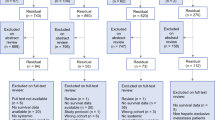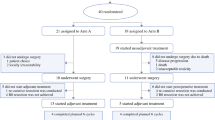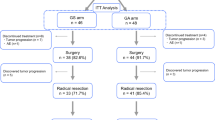Abstract
Background
The TOPAZ-1 phase III trial reported a survival benefit with the anti-programmed cell death ligand 1 (anti-PD-L1) durvalumab in combination with gemcitabine and cisplatin in patients with advanced biliary tract cancer (BTC).
Objective
The present study investigated for the first time the impact on survival of adding durvalumab to cisplatin/gemcitabine compared with cisplatin/gemcitabine in a real-world setting.
Patients and Methods
The analyzed population included patients with unresectable, locally advanced, or metastatic BTC treated with durvalumab in combination with cisplatin/gemcitabine or with cisplatin/gemcitabine alone. The impact of adding durvalumab to chemotherapy in terms of overall survival (OS) and progression free survival (PFS) was investigated with univariate and multivariate analysis.
Results
Overall, 563 patients were included in the analysis: 213 received cisplatin/gemcitabine alone, 350 received cisplatin/gemcitabine plus durvalumab. At the univariate analysis, the addition of durvalumab was found to have an impact on survival, with a median OS of 14.8 months versus 11.2 months [hazard ratio (HR) 0.63, 95% confidence interval (CI) 0.50–0.80, p = 0.0002] in patients who received cisplatin/gemcitabine plus durvalumab compared to those who received cisplatin/gemcitabine alone. At the univariate analysis for PFS, the addition of durvalumab to cisplatin/gemcitabine demonstrated a survival impact, with a median PFS of 8.3 months and 6.0 months (HR 0.57, 95% CI 0.47–0.70, p < 0.0001) in patients who received cisplatin/gemcitabine plus durvalumab and cisplatin/gemcitabine alone, respectively. The multivariate analysis confirmed that adding durvalumab to cisplatin/gemcitabine is an independent prognostic factor for OS and PFS, with patients > 70 years old and those affected by locally advanced disease experiencing the highest survival benefit. Finally, an exploratory analysis of prognostic factors was performed in the cohort of patients who received durvalumab: neutrophil–lymphocyte ratio (NLR) and disease stage were to be independent prognostic factors in terms of OS. The interaction test highlighted NLR ≤ 3, Eastern Cooperative Oncology Group Performance Status (ECOG PS) = 0, and locally advanced disease as positive predictive factors for OS on cisplatin/gemcitabine plus durvalumab.
Conclusion
In line with the results of the TOPAZ-1 trial, adding durvalumab to cisplatin/gemcitabine has been confirmed to confer a survival benefit in terms of OS and PFS in a real-world setting of patients with advanced BTC.


Similar content being viewed by others
References
Rimini M, Puzzoni M, Pedica F, Silvestris N, Fornaro L, Aprile G, et al. Cholangiocarcinoma: new perspectives for new horizons. Expert Rev Gastroenterol Hepatol. 2021;15(12):1367–83. https://doi.org/10.1080/17474124.2021.1991313.
Wu J, Yang S, Xu K, Ding C, Zhou Y, Fu X, et al. Patterns and trends of liver cancer incidence rates in Eastern and Southeastern Asian countries (1983–2007) and predictions to 2030. Gastroenterology. 2018;154(6):1719-1728.e5. https://doi.org/10.1053/j.gastro.2018.01.033.
Bertuccio P, Malvezzi M, Carioli G, Hashim D, Boffetta P, El-Serag HB, et al. Global trends in mortality from intrahepatic and extrahepatic cholangiocarcinoma. J Hepatol. 2019;71(1):104–14. https://doi.org/10.1016/j.jhep.2019.03.013.
Sia D, Villanueva A, Friedman SL, Llovet JM. Liver cancer cell of origin, molecular class, and effects on patient prognosis. Gastroenterology. 2017;152:745–61.
Abou-Alfa GK, Sahai V, Hollebecque A, Vaccaro G, Melisi D, Al-Rajabi R, et al. Pemigatinib for previously treated, locally advanced or metastatic cholangiocarcinoma: a multicentre, open-label, phase 2 study. Lancet Oncol. 2020;21(5):671–84. https://doi.org/10.1016/S1470-2045(20)30109-1.
Goyal L, Meric-Bernstam F, Hollebecque A, Valle JW, Morizane C, Karasic TB, et al. FOENIX-CCA2 study investigators. Futibatinib for FGFR2-rearranged intrahepatic cholangiocarcinoma. N Engl J Med. 2023;388(3):228–39. https://doi.org/10.1056/NEJMoa2206834.
Abou-Alfa GK, Macarulla T, Javle MM, Kelley RK, Lubner SJ, Adeva J, et al. Ivosidenib in IDH1-mutant, chemotherapy-refractory cholangiocarcinoma (ClarIDHy): a multicentre, randomised, double-blind, placebo-controlled, phase 3 study. Lancet Oncol. 2020;21(6):796–807. https://doi.org/10.1016/S1470-2045(20)30157-1.
Zhu AX, Macarulla T, Javle MM, Kelley RK, Lubner SJ, Adeva J, et al. final overall survival efficacy results of ivosidenib for patients with advanced cholangiocarcinoma with IDH1 mutation: the phase 3 randomized clinical ClarIDHy trial. JAMA Oncol. 2021;7(11):1669–77. https://doi.org/10.1001/jamaoncol.2021.3836.
Lamarca A, Kapacee Z, Breeze M, Bell C, Belcher D, Staiger H, et al. Molecular profiling in daily clinical practice: practicalities in advanced cholangiocarcinoma and other biliary tract cancers. J Clin Med. 2020;9(9):2854. https://doi.org/10.3390/jcm9092854.
Rimini M, Loi E, Fabregat-Franco C, Burgio V, Lonardi S, Niger M, et al. Next-generation sequencing analysis of cholangiocarcinoma identifies distinct IDH1-mutated clusters. Eur J Cancer. 2022;175:299–310. https://doi.org/10.1016/j.ejca.2022.08.026.
Rimini M, Fabregat-Franco C, Burgio V, Lonardi S, Niger M, Scartozzi M, et al. Molecular profile and its clinical impact of IDH1 mutated versus IDH1 wild type intrahepatic cholangiocarcinoma. Sci Rep. 2022;12(1):18775. https://doi.org/10.1038/s41598-022-22543-z.
Rimini M, Macarulla T, Burgio V, Lonardi S, Niger M, Scartozzi M, et al. Gene mutational profile of BRCAness and clinical implication in predicting response to platinum-based chemotherapy in patients with intrahepatic cholangiocarcinoma. Eur J Cancer. 2022;171:232–41. https://doi.org/10.1016/j.ejca.2022.05.004.
Oh DY, He AR, Qin S, Chen LT, Okusaka T, Vogel A, et al. A phase 3 randomized, double-blind, placebo-controlled study of durvalumab in combination with gemcitabine plus cisplatin (GemCis) in patients (pts) with advanced biliary tract cancer (BTC): TOPAZ-1. NEJM Evid. 2022. https://doi.org/10.1056/EVIDoa2200015.
Kelley RK, Ueno M, Yoo C, Finn RS, Furuse J, Ren Z, et al. KEYNOTE-966 Investigators. Pembrolizumab in combination with gemcitabine and cisplatin compared with gemcitabine and cisplatin alone for patients with advanced biliary tract cancer (KEYNOTE-966): a randomised, double-blind, placebo-controlled, phase 3 trial. Lancet. 2023;401(10391):1853–65. https://doi.org/10.1016/S0140-6736(23)00727-4.
Rimini M, Fornaro L, Lonardi S, Niger M, Lavacchi D, Pressiani T, et al. Durvalumab plus gemcitabine and cisplatin in advanced biliary tract cancer: an early exploratory analysis of real-world data. Liver Int. 2023;43(8):1803–12. https://doi.org/10.1111/liv.15641.
Valle J, Wasan H, Palmer DH, Cunningham D, Anthoney A, Maraveyas A, et al. ABC-02 Trial Investigators. Cisplatin plus gemcitabine versus gemcitabine for biliary tract cancer. N Engl J Med. 2010;362(14):1273–81. https://doi.org/10.1056/NEJMoa0908721.
Elias R, Giobbie-Hurder A, McCleary NJ, Ott P, Hodi FS, Rahma O. Efficacy of PD-1 & PD-L1 inhibitors in older adults: a meta-analysis. J Immunother Cancer. 2018;6(1):26. https://doi.org/10.1186/s40425-018-0336-8.
Nishijima TF, Muss HB, Shachar SS, Moschos SJ. Comparison of efficacy of immune checkpoint inhibitors (ICIs) between younger and older patients: a systematic review and meta-analysis. Cancer Treat Rev. 2016;45:30–7. https://doi.org/10.1016/j.ctrv.2016.02.006.
Nebhan CA, Cortellini A, Ma W, Ganta T, Song H, Ye F, et al. Clinical outcomes and toxic effects of single-agent immune checkpoint inhibitors among patients aged 80 years or older with cancer: a multicenter international cohort study. JAMA Oncol. 2021;7(12):1856–61. https://doi.org/10.1001/jamaoncol.2021.4960.
Vithayathil M, D’Alessio A, Fulgenzi CAM, Nishida N, Schönlein M, von Felden J, et al. Impact of older age in patients receiving atezolizumab and bevacizumab for hepatocellular carcinoma. Liver Int. 2022;42(11):2538–47. https://doi.org/10.1111/liv.15405.
Kugel CH 3rd, Douglass SM, Webster MR, Kaur A, Liu Q, Yin X, et al. Age correlates with response to anti-PD1, reflecting age-related differences in intratumoral effector and regulatory T-cell populations. Clin Cancer Res. 2018;24(21):5347–56. https://doi.org/10.1158/1078-0432.CCR-18-1116.
Tang Q, Zhao S, Zhou N, He J, Zu L, Liu T, et al. PD-1/PD-L1 immune checkpoint inhibitors in neoadjuvant therapy for solid tumors (Review). Int J Oncol. 2023;62(4):49. https://doi.org/10.3892/ijo.2023.5497.
Liu J, Blake SJ, Yong MC, Harjunpää H, Ngiow SF, Takeda K, et al. Improved efficacy of neoadjuvant compared to adjuvant immunotherapy to eradicate metastatic disease. Cancer Discov. 2016;6(12):1382–99. https://doi.org/10.1158/2159-8290.CD-16-0577.
Cascone T, Hamdi H, Zhang F, et al. Abstract 1719: Superior efficacy of neoadjuvant compared to adjuvant immune checkpoint blockade in non-small cell lung cancer. Cancer Res. 2018;78(13_Suppl):1719.
Chaft JE, Rimner A, Weder W, Azzoli CG, Kris MG, Cascone T. Evolution of systemic therapy for stages I-III non-metastatic non-small-cell lung cancer. Nat Rev Clin Oncol. 2021;18(9):547–57. https://doi.org/10.1038/s41571-021-00501-4.
Blank CU, Rozeman EA, Fanchi LF, Sikorska K, van de Wiel B, Kvistborg P, et al. Neoadjuvant versus adjuvant ipilimumab plus nivolumab in macroscopic stage III melanoma. Nat Med. 2018;24(11):1655–61. https://doi.org/10.1038/s41591-018-0198-0.
Necchi A, Anichini A, Raggi D, Briganti A, Massa S, Lucianò R, et al. Pembrolizumab as neoadjuvant therapy before radical cystectomy in patients with muscle-invasive urothelial bladder carcinoma (PURE-01): an open-label, single-arm, phase II study. J Clin Oncol. 2018;36(34):3353–60. https://doi.org/10.1200/JCO.18.01148.
Mittendorf EA, Zhang H, Barrios CH, Saji S, Jung KH, Hegg R, et al. Neoadjuvant atezolizumab in combination with sequential nab-paclitaxel and anthracycline-based chemotherapy versus placebo and chemotherapy in patients with early-stage triple-negative breast cancer (IMpassion031): a randomised, double-blind, phase 3 trial. Lancet. 2020;396(10257):1090–100. https://doi.org/10.1016/S0140-6736(20)31953-X.
Chalabi M, Fanchi LF, Dijkstra KK, Van den Berg JG, Aalbers AG, Sikorska K, et al. Neoadjuvant immunotherapy leads to pathological responses in MMR-proficient and MMR-deficient early-stage colon cancers. Nat Med. 2020;26(4):566–76. https://doi.org/10.1038/s41591-020-0805-8.
Maithel SK, Keilson JM, Cao HST, Rupji M, Mahipal A, Lin BS, et al. NEO-GAP: a single-arm, phase II feasibility trial of neoadjuvant gemcitabine, cisplatin, and nab-paclitaxel for resectable, high-risk intrahepatic cholangiocarcinoma. Ann Surg Oncol. 2023;30(11):6558–66. https://doi.org/10.1245/s10434-023-13809-5.
Absenger G, Szkandera J, Pichler M, Stotz M, Arminger F, Weissmueller M, et al. A derived neutrophil to lymphocyte ratio predicts clinical outcome in stage II and III colon cancer patients. Br J Cancer. 2013;109(2):395–400. https://doi.org/10.1038/bjc.2013.346.
Lin G, Liu Y, Li S, Mao Y, Wang J, Shuang Z, Chen J, Li S. Elevated neutrophil-to-lymphocyte ratio is an independent poor prognostic factor in patients with intrahepatic cholangiocarcinoma. Oncotarget. 2016;7(32):50963–71. https://doi.org/10.18632/oncotarget.7680.
Guo JC, Lin CC, Lin CY, Hsieh MS, Kuo HY, Lien MY, et al. Neutrophil-to-lymphocyte ratio and use of antibiotics associated with prognosis in esophageal squamous cell carcinoma patients receiving immune checkpoint inhibitors. Anticancer Res. 2019;39(10):5675–82. https://doi.org/10.21873/anticanres.13765.
Nozawa H, Chiu C, Hanahan D. Infiltrating neutrophils mediate the initial angiogenic switch in a mouse model of multistage carcinogenesis. Proc Natl Acad Sci U S A. 2006;103(33):12493–8. https://doi.org/10.1073/pnas.0601807103.
Shi F, Shi M, Zeng Z, Qi RZ, Liu ZW, Zhang JY, et al. PD-1 and PD-L1 upregulation promotes CD8(+) T-cell apoptosis and postoperative recurrence in hepatocellular carcinoma patients. Int J Cancer. 2011;128(4):887–96. https://doi.org/10.1002/ijc.25397.
Fridlender ZG, Sun J, Kim S, Kapoor V, Cheng G, Ling L, et al. Polarization of tumor-associated neutrophil phenotype by TGF-beta: “N1” versus “N2” TAN. Cancer Cell. 2009;16(3):183–94. https://doi.org/10.1016/j.ccr.2009.06.017.
Tanoue T, Morita S, Plichta DR, Skelly AN, Suda W, Sugiura Y, et al. A defined commensal consortium elicits CD8 T cells and anti-cancer immunity. Nature. 2019;565(7741):600–5. https://doi.org/10.1038/s41586-019-0878-z.
Caruana I, Simula L, Locatelli F, Campello S. T lymphocytes against solid malignancies: winning ways to defeat tumours. Cell Stress. 2018;2(8):200–12. https://doi.org/10.15698/cst2018.07.148.
Khaki AR, Li A, Diamantopoulos LN, Bilen MA, Santos V, Esther J, et al. Impact of performance status on treatment outcomes: a real-world study of advanced urothelial cancer treated with immune checkpoint inhibitors. Cancer. 2020;126(6):1208–16. https://doi.org/10.1002/cncr.32645.
Noronha V, Abraham G, Patil V, Joshi A, Menon N, Mahajan A, et al. A real-world data of Immune checkpoint inhibitors in solid tumors from India. Cancer Med. 2021;10(5):1525–34. https://doi.org/10.1002/cam4.3617.
Mollica V, Rizzo A, Marchetti A, Tateo V, Tassinari E, Rosellini M, et al. The impact of ECOG performance status on efficacy of immunotherapy and immune-based combinations in cancer patients: the MOUSEION-06 study. Clin Exp Med. 2023. https://doi.org/10.1007/s10238-023-01159-1.
Olkus A, Tomczak A, Berger AK, Rauber C, Puchas P, Wehling C, et al. durvalumab plus gemcitabine and cisplatin in patients with advanced biliary tract cancer: an exploratory analysis of real-world data. Target Oncol. 2024;19(2):213–21. https://doi.org/10.1007/s11523-024-01044-1.
Author information
Authors and Affiliations
Corresponding author
Ethics declarations
Funding
No external funding was used in the preparation of this manuscript.
Conflict of Interest
L.R. reports consulting fees from AbbVie, AstraZeneca, Basilea, Bayer, BMS, Eisai, Elevar Therapeutics, Exelixis, Genenta, Hengrui, Incyte, Ipsen, IQVIA, Jazz Pharmaceuticals, MSD, Nerviano Medical Sciences, Roche, Servier, Taiho Oncology, and Zymeworks; lecture fees from AstraZeneca, Bayer, BMS, Eisai, Incyte, Ipsen, Merck Serono, Roche, and Servier; travel expenses from AstraZeneca; research grants (to institution) from Agios, AstraZeneca, BeiGene, Eisai, Exelixis, Fibrogen, Incyte, Ipsen, Lilly, MSD, Nerviano Medical Sciences, Roche, Servier, and Zymeworks. T.P. received consulting fees from Bayer, Ipsen, and AstraZeneca; institutional research funding from Roche, Bayer, and AstraZeneca; travel expenses from Roche. A.C.G. reports consulting fees from AstraZeneca, Bayer, BMS, Eisai, Incyte, Ipsen, IQVIA, MSD, Roche, and Servier; lecture fees from AstraZeneca, Bayer, BMS, Eisai, Incyte, Ipsen, Roche, and Servier; travel expenses from AstraZeneca; research grants (to institution) from AstraZeneca and Eisai. Margherita Rimini, Gianluca Masi, Sara Lonardi, Federico Nichetti, Daniele Lavacchi, Lucchetti Jessica, Guido Giordano, Mario Scartozzi, Emiliano Tamburini, Alessandro Pastorino, Ilario Giovanni Rapposelli, Bruno Daniele, Erika Martinelli, Ingrid Garajova, Giuseppe Aprile, Marta Schirripa, Vincenzo Formica, Francesca Salani, Costanza Winchler, Francesca Bergamo, Rita Balsano, Eleonora Gusmaroli, Angotti Lorenzo, Matteo Landriscina, Andrea Pretta, Ilaria Toma, Chiara Pirrone, Anna Diana, Francesco Leone, Oronzo Brunetti, Giovanni Brandi, Silvio Ken Garattini, Maria Antonietta Satolli, Federico Rossari, Lorenzo Fornaro, Monica Niger, Valentina Zanuso, Antonio De Rosa, Francesca Ratti, Luca Aldrighetti, Filippo De Braud, Silvia Foti, Mario Domenico Rizzato, Caterina Vivaldi, Cascinu Stefano, and Lorenzo Antonuzzo declare that they have no conflicts of interest that might be relevant to the contents of this manuscript.
Ethics Approval and Consent to Participate
The study was conducted in accordance with the Declaration of Helsinki and the protocol was approved by the ethics committee of each institution involved in the project. Under the condition of retrospective archival tissue collection and patient data anonymization, our study was exempt from the acquisition of informed consent from patients by the institutional review board.
Consent to Publish
Not applicable.
Data Availability
The datasets generated during and/or analyzed during the current study are available from the corresponding author on reasonable request.
Code Availability
Not applicable.
Authors’ Contributions
Conception and design: A. Casadei-Gardini, M. Rimini, Lorenza Rimassa, Lorenzo Fornaro, Sara Lonardi, Lorenzo Antonuzzo. Acquisition of data (acquired and managed patients): All authors. Analysis and interpretation of data: A. Casadei-Gardini, M. Rimini, Lorenza Rimassa, Lorenzo Fornaro, Sara Lonardi, Lorenzo Antonuzzo. Writing, review, and/or revision of the manuscript: A. Casadei-Gardini, M. Rimini, Lorenza Rimassa, Lorenzo Fornaro, Sara Lonardi, Lorenzo Antonuzzo. Final approval of manuscript: All authors.
Supplementary Information
Below is the link to the electronic supplementary material.
Rights and permissions
Springer Nature or its licensor (e.g. a society or other partner) holds exclusive rights to this article under a publishing agreement with the author(s) or other rightsholder(s); author self-archiving of the accepted manuscript version of this article is solely governed by the terms of such publishing agreement and applicable law.
About this article
Cite this article
Rimini, M., Masi, G., Lonardi, S. et al. Durvalumab Plus Gemcitabine and Cisplatin Versus Gemcitabine and Cisplatin in Biliary Tract Cancer: a Real-World Retrospective, Multicenter Study. Targ Oncol 19, 359–370 (2024). https://doi.org/10.1007/s11523-024-01060-1
Accepted:
Published:
Issue Date:
DOI: https://doi.org/10.1007/s11523-024-01060-1




